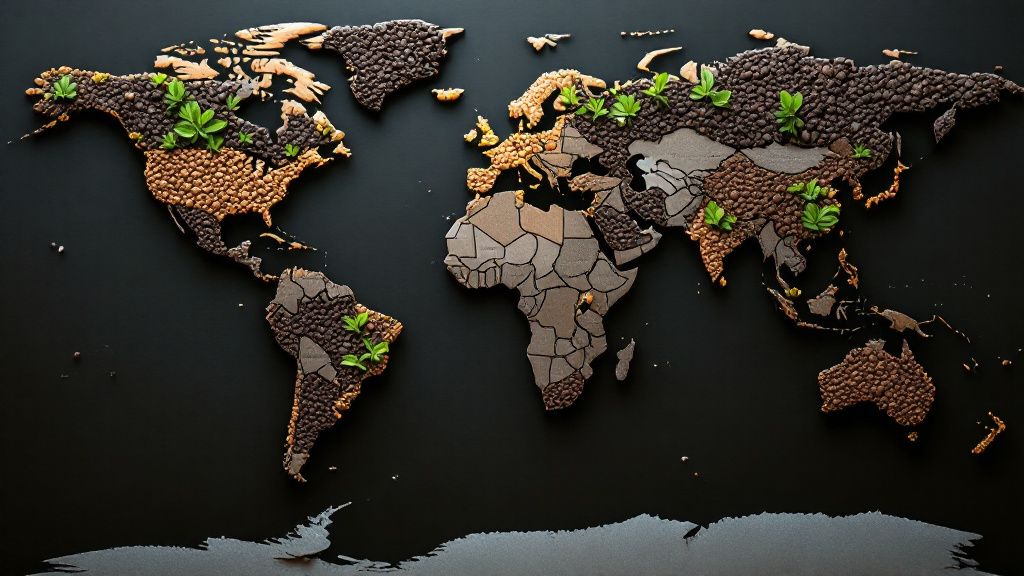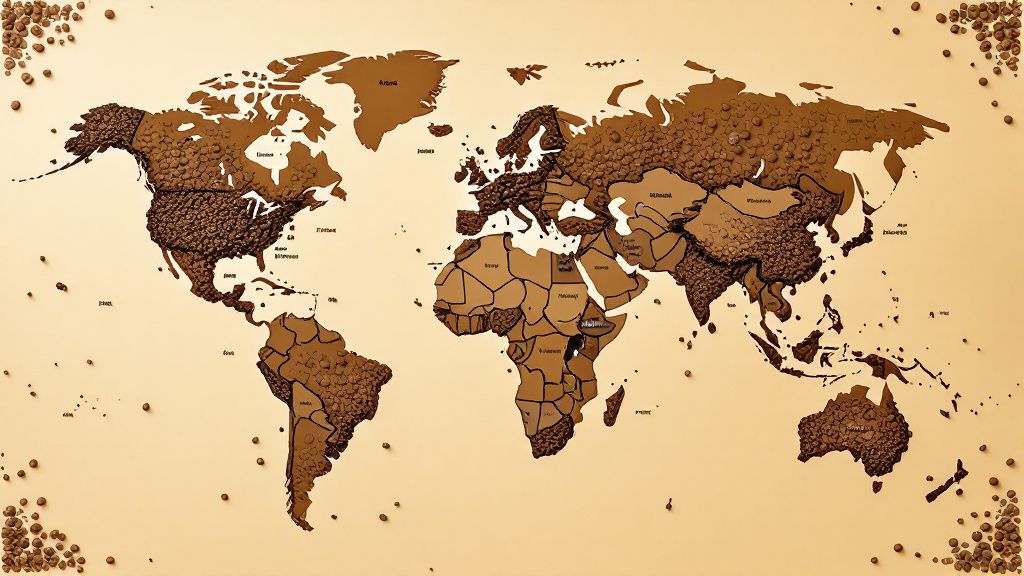How Coffee Shapes Morning Routines Around the World
In a bustling world filled with diverse traditions, coffee plays a pivotal role in shaping your morning routines, transcending cultural boundaries. Whether you prefer a strong espresso shot in Italy or a sweet latte in a bustling New York café, coffee intricately weaves itself into your daily start. Across countries, morning routines are tailored around the warmth and aroma of a fresh brew, often pairing beautifully with breakfast. From the comforting pour-over ritual in Tokyo to the rich, communal coffee culture of Addis Ababa, coffee not only awakens your senses but also connects you to cultural roots, offering various benefits beyond its invigorating caffeine kick.

The Ritual of Morning Coffee
One of the challenges in today's fast-paced world is transforming the chaotic start of your day into a serene ritual. Finding comfort in the familiar routine of morning coffee can offer a soothing transition from sleep to activity. The ritual of preparing and savoring your morning brew becomes a moment of mindfulness and reflection. Across the globe, this ritual can vary—some cherish the simplicity of a classic French press, while others incorporate elaborate traditions like the Turkish coffee ceremony, fostering a deep connection with cultural heritage and personal identity.
This issue can be addressed through the cultivation of personal coffee rituals that ground your morning routines. By consciously engaging with the process, whether grinding fresh beans, meticulously measuring water, or simply sitting with a warm mug in hand, you can transform a habitual activity into a meaningful practice. These rituals offer coffee benefits beyond caffeine, such as reducing stress and providing a sense of accomplishment at the start of the day. Such routines also highlight the connection between coffee and breakfast, often setting the tone for a balanced and nourishing experience. As coffee and culture intertwine, the morning ritual becomes a cornerstone of daily life, revealing rich, personal significance across different communities.

Coffee and Economy of Different Countries
Coffee significantly influences the economy in various countries, creating both opportunities and challenges. In nations like Brazil and Colombia, coffee cultivation is a major economic driver, providing jobs to millions and contributing substantially to GDP. The trade of coffee beans is vital, supporting small farmers and impacting financial stability across different regions. These countries rely on coffee not only for exports but also as a cherished part of local morning routines that enhance community life.
In Ethiopia, coffee and culture deeply intertwine, reflecting the beverage's integral role in both societal rituals and economic frameworks. The traditional coffee ceremony underscores a unifying cultural identity and sustains local economies through tourism and trade. As you explore these flavors, you're also engaging with a rich history where coffee acts as a cultural ambassador, representing countries on a global stage and shaping their economic landscape.
According to recent studies, coffee's contribution to global trade explains how its cultivation affects international markets and local economies alike. The "coffee paradox" outlines how, despite its cultural and economic importance, producers often struggle with price volatility and sustainability issues. As you sip your cup, it’s fascinating to consider how coffee benefits economies far beyond mere consumption, symbolizing a complex network of cultural and financial ties across the world.

Different Coffee Types and Their Morning Roles
Exploring the world of coffee reveals an array of types that play distinctive roles in morning routines across different cultures. For many, espresso is synonymous with a quick, invigorating start. It offers a concentrated caffeine kick, perfect for bustling mornings when time is of the essence. This beloved brew is entrenched in the history of Italian mornings, embodying their fast-paced yet richly flavored lifestyle, often acting as an essential during breakfast meetings.
In contrast, the French prefer a leisurely breakfast with café au lait, where coffee and steamed milk create a silky, comforting experience. Such a drink complements flaky pastries, turning breakfast into a relaxed ritual rather than a rush. This slower pace celebrates the coffee and culture of France, encouraging you to savor the subtle flavors and aromas that accompany each sip as part of a leisurely morning routine.
One unpopular opinion about different coffee types and their morning roles is that instant coffee deserves more respect. Often dismissed as inferior, instant coffee provides an accessible, hassle-free option for those short on time. Despite perceptions, advancements in freeze-drying technology have elevated the taste profile significantly. While some may scoff, millions around the globe rely on its convenience, underscoring its relevance in shaping diverse morning routines.
In Ethiopia, spiced coffee garnished with cinnamon or cardamom turns the morning routine into a festive occasion. This approach not only emphasizes coffee benefits like providing warmth and spice-infused energy but also creates a connection to tradition. Such rich flavors invite you to participate in a communal celebration, intertwining culinary art with daily rituals in a unique cultural glossary.
In Scandinavian countries, the simple pleasure of a black coffee, known as ‘kaffe’, holds its own special place. It’s a staple that pairs perfectly with a Nordic breakfast of rye bread and cheese. Its simplicity highlights a deeply ingrained cultural affinity for straightforward, hearty beginnings. With each sip, you're engaging in a time-honored tradition, echoed in daily practices and shared routines.

How Coffee Influences Productivity
Coffee significantly influences productivity by providing a much-needed boost in focus and energy. As you embrace your morning routines with a steaming cup, coffee benefits you by enhancing alertness, thanks to caffeine's stimulation of the central nervous system. This effect is especially vital during early work hours or demanding tasks, helping you tackle your to-do list with intensified clarity and concentration.
In various cultures, the social aspect of coffee breaks contributes to productivity as well. When you take a moment to savor a cup, either alone or with colleagues, it fosters a sense of community and rejuvenates your energy. This ritual, deeply ingrained in coffee and culture, has become increasingly important as people navigate hectic work environments, offering a brief yet impactful mental reset.
In the next few years, the role of coffee in enhancing productivity is likely to evolve further with innovations like nootropic-infused coffee blends. These blends, designed to improve cognitive function, could reshape how you perceive your morning brew—not just as a wake-up call, but as a crucial tool in optimizing daily performance. As trends in wellness intersect with traditional coffee culture, expecting more personalized and effective ways to leverage its benefits in morning routines.

Coffee Traditions Across Cultures
Coffee traditions across cultures offer a vibrant tapestry of flavors and rituals that highlight the global significance of this beloved beverage. In Italy, for instance, the day often begins with a quick espresso at a local bar, a tradition deeply woven into Italian morning routines. This quick shot of caffeine delivers coffee benefits that prepare you to embrace the bustling Italian lifestyle with gusto and energy.
In Ethiopia, the birthplace of coffee, the traditional coffee ceremony exemplifies coffee and culture in its purest form. This elaborate ritual involves roasting, grinding, and brewing beans in a communal setting. Guests are invited to participate, fostering social bonds and a shared appreciation for the beverage's rich history. Here, coffee is more than just a morning ritual—it is a meaningful cultural exchange.
For example, in Japan, the art of hand-dripped coffee has been perfected over generations. Attention to detail and a focus on aesthetic presentation reflect a broader cultural appreciation for craftsmanship and tranquility. Morning routines in Japan may include a slow and deliberate process of brewing, turning coffee-making into a meditative practice—a beautiful expression of coffee at the intersection of culture and daily tranquility.
In Scandinavian countries, "fika," a coffee break paired with a sweet treat, is an integral part of daily life. It's more than just a pause for coffee; it's an opportunity to connect with friends or colleagues, promoting a balanced work-life routine. This tradition exemplifies how coffee contributes to a community's overall wellness and productivity, enriching both personal and professional relationships.
 Ratio Eight S2
Ratio Eight S2
 Ratio Eight Original
Ratio Eight Original
 Ratio Six
Ratio Six
 Ratio Four
Ratio Four
 Compare Machines
Compare Machines






